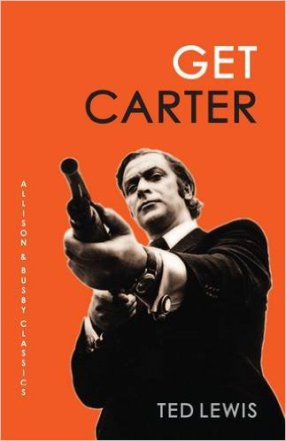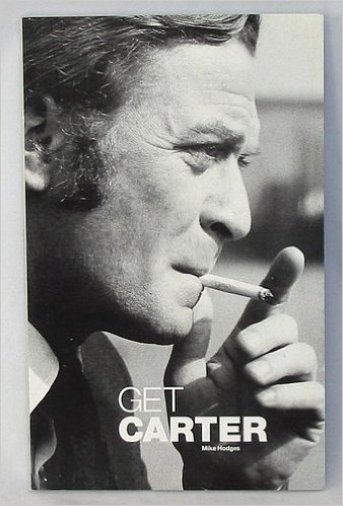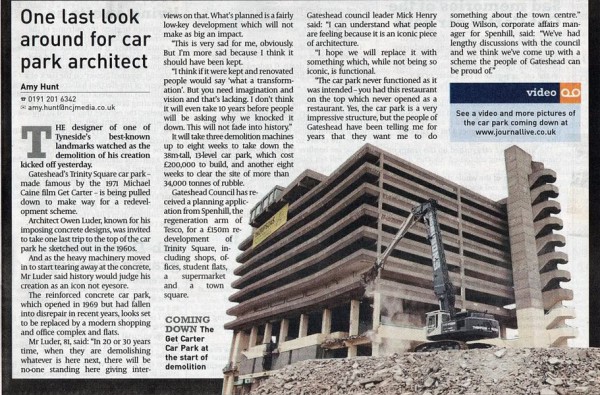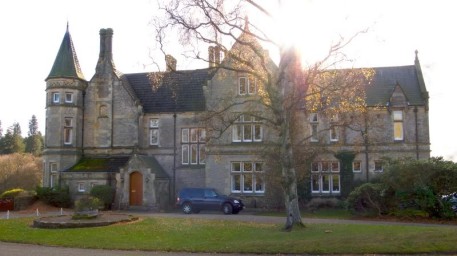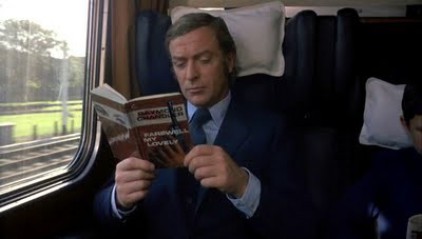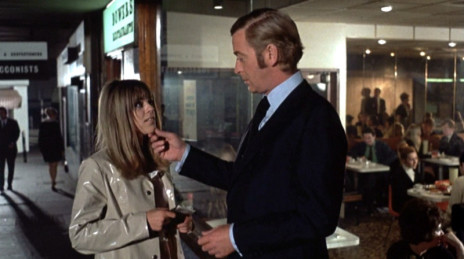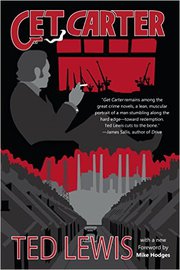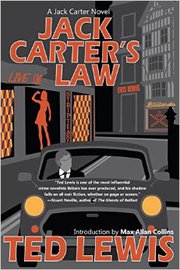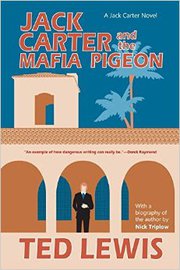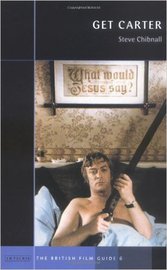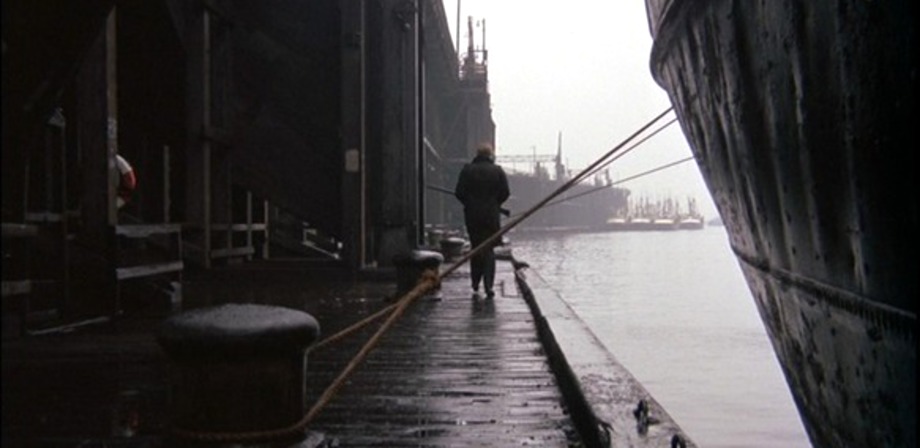
GET CARTER (1971)
From the novel 'Jack's return home' by Ted Lewis published in 1968
Get Carter is one of the most iconic British films, but the source novel is far less known, and indeed to my knowledge is out of print. I got my copy about 2 years from abebooks, but the other Carter novels ('Jack Carter's Law' and 'Jack Carter and the Mafia Pigeon') are both very expensive to buy (£30-£45). Even as early as 1992, when this edition (right) was published by Allison & Busby, not only is Caine on the cover, but the title of the book is from the film rather than the original; I would imagine it is impossible to get the book with its original title now.
What follows assumes a reasonably sound knowledge of the film, and I have not explained who the characters are, on the assumption that anyone reading this will know the film well enough not to need such introductions.
Plot structure
I have summarised and compared the plot of the book and the film below, concentrating on the main narrative elements and ignoring minor differences:
| Book | Film |
| N/A | Carter tells his employers, Gerald and Les Fletcher, that he is going back home to the North to find out what happened to his brother Frank, who has just died. |
| Carter goes to unnamed town (but clearly meant to be Scunthorpe) to find out what happened to his brother Frank | Same, except the city is now Newcastle. |
| Arranges a room, goes to Frank's house | Same |
| Meets Frank's daughter Doreen, and attends funeral, where he meets Margaret, Frank's 'partner'. He also meets Eddie and Keith, friends of Frank's. | Same. |
| Meets Eric Paice in the pub 'The Cecil'. | Goes to see Albert Swfit at the race track, meets Eric Paice instead |
| Follows Eric to Cyril Kinnear's club, meets Kinnear and Glenda | Same, except he meets Kinnear at his house |
| Carter goes back to The Cecil pub, where Keith tells him that Thorpey has been asking after him. | Same |
| N/A | Sees Doreen, and gives her some money. Rings Anna from his landlady's house |
| Goes to see Albert Swift at his house, where he is clearly pimping out his wife. Carter then goes to get information from a man called Rowley in a pub | N/A |
| Thorpey turns up with three men and confronts Carter and Keith outside the landlady's house. Carter sees them off and gets Keith inside, and makes him say who is behind it all (Brumby). | Same |
| Carter goes to see Brumby, but realises that he has been tricked, and returns to the guest house to find landlady beaten up and Keith taken by the men. | Same |
| Carter goes to bed with the landlady. In the morning he finds two men, Peter the Dutchman and Con, sent by the Fletchers to bring him back to London, come into his room. He sees them off the premises at the end of a shotgun, and gets away by car. | Same |
| Carter arranges to meet Margaret in a pub, but Peter and Con turn up. He sees Margaret, then later assaults the two men and tries to get away. He is rescued by Glenda in her car. | Same, except that the meeting is on a bridge, and Carter runs away from Peter and Con without having to resort to violence. |
| Glenda takes Carter to see Brumby in her flat. Brumby offers him £1000 to kill Kinnear, Carter refuses. | Same, except the venue is the famous car park. |
| Carter confronts Con outside Glenda's flat; they drive to see Doreen, who is being more or less held hostage by Peter. Carter rescues Doreen and drives off with her, but she gets out the car, fed up with him. | N/A |
| Carter goes back to Glenda's flat, where he watches a porn film which features Doreen and Albert Swift, clearly filmed in Albert's house. He drives off with Glenda in the car with him. | Carter goes back to Glenda's flat with her, and they have sex. The rest is then the same, except that he half drowns Glenda, then drags her into the boot of her own car before driving off. |
| Goes to see Albert at his house, chases him and kills him by stabbinhg him. | Same, except that the scene takes place in a bookies on the other side of the river. |
| Con, Peter and Eric arrive at the house with two other men (hired) and there is a shoot out. Carter kills Peter the Dutchman. He is told that Gerald Fletcher knows about his relationship with Audrey (Anna in the book), so Carter realises that she will be disfigured as a punishment. Glenda has run off in the confusion. | Same, except that the shoot out takes place at the ferry docks and there are no hired men. Glenda is still in the boot of the car when Con and Eric push it in the river and she drowns as Carter watches. |
| Carter, on the run from the police, meets Brumby and they go back to Glenda's flat. Carter is about to kill Brumby by throwing him over the edge of the balcony of the block of flats but is seen, and gets away. Brumby is caught by the police as is Glenda. | Carter goes to find Brumby at the car park, and kills him by throwing him over the edge. |
| Carter posts the porn film off, and rings Maurice, a London contact, who confirms that Audrey is a "write-off". Carter then asks where he can get some heroin ("white stuff") and is told to see a man in Grimsby. | Carter posts the film to the Vice Squad, and then gets the heroin and syringes from a man in Newcastle. |
| Carter finds out Margaret's address and abducts her from her home. | Same, except he follows her from the bingo hall. |
| Goes to see a man called Storey to buy heroin. | See earlier. |
| Carter finds Kinnear's residence and rings him from a phone box. Arranges with Kinnear to get Eric to a secluded location (an abandoned brickworks) about 4-5am next day | Same, only with Margaret in the phone box with him. |
| N/A | Kinnear rings an unknown man up after Carter's call and makes some arrangement with him. |
| Carter injects Margaret with the heroin. | Same, but he also drags her into the lake. |
| Carter rings a journalist to give him the full story so that the police can't cover anythying up. | N/A |
| N/A (assumed?) | Police turn up and arrest Kinnear and other partygoers. Margaret is found dead in the lake. |
| Carter confronts Eric at the brickworks, but Eric stabs Carter. Eric is about to shoot Carter but the gun explodes in his face and kills him. | Carter confronts Eric at a deserted colliery and kills him. |
| Carter is left dying from his knife wound, but Con turns up, finds his own gun that Carter had taken off him earlier, and leaves him lying there. It is unclear if Carter is going to live or die, more likely the latter. | N/A |
| N/A | As Carter is about to dispose of the shotgun, the unknown man Kinnear spoke to hours before shoots him dead with a single shot from a rifle. |
Locations
What is immediately noticeable is that the plot of the film and the book are almost identical, and that the narrative structure is very similar with very little out of place. The main difference however is that the various meetings that take place throughout the film, as Carter tries to get information from people, take place in the book mainly in nondescript pubs, whereas the film uses its Newcastle location to excellent effect.
The book, by general consent, is set in Scunthorpe, although the town itself is never named. There are several clues to this. The book begins with Carter on the train from Euston to Doncaster, where he has to catch a connection. There is a train service from Doncaster to Scunthorpe, and the timing is about right - Carter arrives in Doncaster at 5pm and is in a pub in the town at 7:15pm. But of course the one thing that is constantly mentioned throughout the book is that the town (or rather "Too big for a town, too small for a city") is a steel town, so it could only be Scunthorpe.
In the film, when Keith asks Carter who Brumby is, Carter asks "Ever been to Westsea? Ever been to an arcade there and put a penny in the slot machine? " whereas in the book instead:
'Cliff Brumby?' I said. Ever been to Cleethorpes?'
Keith nodded.
'Ever walked into an arcade and put a penny in a slot machine?'
'Yes,' said Keith.
'Well, ten to one the slot machine belongs to Brumby and like as not the bloody arcade as well. Same in Brid and Skeggie..." [referring obviously to Bridlington and Skegness].
Again, although Bridlington is up the coast towards the North-East, the references to Cleethorpes and Skegness make it clear that the book is set in this area of North=East Lincolnshire. There is even more confirmation when Carter has to go to Grimsby to get heroin from a dealer.
It is fascinating to hear why the location was changed from Scunthorpe to Newcastle, and Mike Hodges, who wrote the screenplay from Lewis's novel as well as directing, is wihout doubt the best person to explain how this happened:
"I can't remember why I didn't locate the film in a steel town. Maybe because I didn't know any...[whilst in the Navy] they took me to...every fishing port in the British Isles...I melted into a world of brutal Hogarthian intensity, and was mesmerized. These were the places I kept thinking of as I read 'Jack's Return Home'.
Lowestoft. Grimsby. Hull. Each had been decimated by developers.The pubs, cafes and dodgy boarding houses gone. Thirteen years had passed. The producer, Michael Klinger, had insisted that he, his driver and Yank car take me on my recce up the east coast."
Hodges however describes how he remembered one last place:
"On the brink of returning south, I remembered sailing into North Shields. My memories of it were vivid. We pressed on and came to Newcastle. The visual drama of the place took my breath away. Seeing the great bridges crossing the Tyne, the waterfront, the terraced house stepped up each side of the deep valley, I knew that Jack was home. And although the developers were breathing down Scotswood Road, they hadn't yet gobbled it up. We'd got there in time. But only just."
(from Mike Hodges's Preface to the screenplay, published by ScreenPress Books 2001)
This goes a long way to explain Get Carter's appeal, and the reason that it plays such an important part in North-East film culture, and why there are so many websites and tours devoted to the subject of Get Carter's locations.
In the novel Kinnear's house is in Malton, three miles near Sowerby - Malton and Sowerby are in North Yorkshire, although they are more than 3 miles apart, so it may be that this is just made up by Lewis. Hodges was fortunate enough to find Dryderdale Hall (right), in Hamsterley near Bishop Auckland, which had its own history which tied in very interestingly with the story. There is not enough space to relate this on this website, but Steve Chibnall's book (see below) recounts this aspect of the film.
Backstory in 'Jack's Return Home'
There are some areas where, inevitably I suppose, the book does give more indication than in the film of some of Jack Carter's history - with Frank, with Doreen, with Albert Swift and Eric Paice.
One such example is that Doreen's disupted parentage is only hinted at in the film, when Keith shouts after him "You even screwed his wife didn't yer?! The poor bastard didn't even know if the kid was his!" In the book this is made much more explicit, as Carter ponders the time when he had sex, very briefly, when he was drunk and so was Frank's wife, Muriel.
Carter's relationship with Albert Swfit also features much more prominently in the book, and indeed there is a long scene, as Carter reminisces, involving Albert, a young Carter and Frank in a pool hall where Frank proves himself a coward and Carter is disgusted by him.
The other main difference is that in the novel, as one might expect, there is much more of a 'back story' regarding Carter's relationship in the past with Frank, with Albert, Eric and others. These give more depth to the story, which otherwise would become more a series of encounters with little meaning, with only the general thuggery to keep it going. I wonder if Mike Hodges ever gave any consideration to providing flashbacks, which would have been the obvious method?
However, although the book is written in the first person, the reader still gets very little idea of exactly why Carter is pursuing Frank's killers - we get no indication of what is motivating him, although I am always reminded of some lines of Bogart's in The Maltese Falcon, at the start of this clip:
That always reminds me of Jack Carter - I can imagine a scene where he is trying to explain to Kinnear, or Brumby, or Eric Paice, why he is about to kill them, and coming out with exactly the same reasoning - "when your brother's killed you're supposed to do something about it, whether you liked him or not, you're supposed to do something about it".
Is Carter really going to South Africa/South America?
One minor aspect of the film which I have always wondered about is the (brief) element where Carter asks Doreen what she is going to do now, and offers her the chance to go to South America with him and his fiancee (referring to Anna). Doreen does not seem very keen and the matter is dropped (indeed, he only sees her one more time in the film, when he gives her some money and she returns to a cafe with her friend - see above). I have read articles where this offer is described as 'fantasy' and 'wish-fulfilment', but the book makes it clear (unless Carter is deluding himself, and he is not a character who suffers from delusions!) that it is an idea very grounded in reality. In the novel Carter says to Doreen:
'I'm off to South Africa next week. With a woman I may or may not end up marrying. We're flying on Wednesday. I've got three tickets. Why don't you come with us?'
There is clear evidence that this is not just a fantasy - later, Carter returns to the house where Doreen is asleep, and he starts thinking:
I tried to see something of Frank in her but I'd stared at her for too long: she was just a young girl I'd met for the first time that morning. A young girl I'd been to a funeral with.
And now in a way, it didn't matter who she was. If she came to South Africa with me and Audrey then it was up to me to take up where Frank'd left off. Mine or not, like it or not. Whatever she felt about me wouldn't matter all that much: she'd never be short of anything if she came with us. If she came. If she didn't I wasn't going to make her. She could suit herself. I always had done. If she didn't come I'd make arrangements for her to have set amounts of cash from time to time.
The offer is repeated later, but Carter refers to it again when he rings a contact, Maurice, during which call the latter tells Carter that Audrey (Anna in the film) has been 'got at' by Gerald. Carter speaks first in this section of the book:
'What's she like?'
'A write-off.'
So that was that. Now there was Gerald as well as the others. Eventually Maurice said:
'Jack?'
'Yeah, listen. You get her out of it, right? Tomorrow, Monday, whenever she can be moved. Same plan. But get her away.'
'Right. What shall I tell her about you?'
'Nothing.'
'She'll want to know. She might not go if I don't tell her something.'
'All right. Tell her I'll follow her next week. Tell her it's taking longer than I thought. But make it sound good. Make her believe it's the truth. Otherwise she won't go and that won't do.'
My interpretation of this is that, firstly, Carter intends to kill Gerald Fletcher as well now, and secondly, that the phrase 'same plan' means they really were going to South Africa (not South America, as in the film, a less likely destination) but that Carter is now not going, or at least not until he sorts out the others, including Gerald. This gives a very clear idea of what Carter's plans are once he sorts out Frank's killers, whereas in the film this is something of a forgotten loose end (which becomes irrelevant anyway due to the introduction of Kinnear's hitman who shoots Carter dead). In the film the offer to go to South America is made twice, this clip places the two scenes together:
Dialogue
There are two famous dialogue scenes in the film, which have very interesting antecedents in the book. The first is the "In a thin glass" line in the pub in Newcastle; in the novel here is the scene as written:
I put my hold-all down and looked at the barman. He didn't move.
'Pint of bitter,' I said.
He let his arms unfold, reached out for a pint mug and made his weary way to the pumps and without putting anything more into it than it needed he began to pull the pint.
'in a thin glass please,' I said.
The barman looked at me and the bloke down the bar looked at the barman.
'Why didn't you bloody well say?' said the barman, slowly putting the brakes on the beer.
'I was going to, but you were too fast for me.'
The bloke down the bar threw back his head and gave a short hard laugh.
Famously, in the film the 'please' has been dropped, and equally significantly (if not more so) Carter clicks his fingers at the barman before uttering the line. Here it is as we know and love it:
The other line(s) of course comes when Carter first confronts Brumby, and realises that he has been sent on a wild goosechase by Thorpey. There is no doubt in my mind that the film version is infinitely superior. Here is the orginal novel version:
'Cliff, you're a big bloke - you're in good shape. But I know more than you do.'
Strange that it has changed around completely (Brumby is now in bad shape) and of course the rest is missing. Here is the version we all know:
The web has a huge amount of material on the film, of which I've probably only seen a very small amount, but a lot of it is very interesting. In particular there's a 'reelstreets' style website on the locations used in Get Carter, but I can't find it now (it also has some very good stuff on Payroll (1961), also shot in Newcastle).
